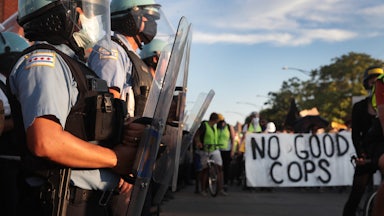Eric Adams is not yet—at least officially—the Democratic candidate for mayor of New York, but the takeaway from his strong showing in the city’s primary has led pundit after pundit to reach the same conclusion: Democrats need to take crime more seriously. After all, New York City is in the midst of a wave of violent crime; voters rated it the most important issue, even more than the recovery from Covid-19. And Adams was the anti-crime candidate. How much more do you need to know?
There are many factors that complicate this analysis, most notably that Adams was simultaneously, as my colleague Alex Pareene noted, straddling being the race’s anti-crime candidate and its police reform candidate. But none of that apparently matters in most mainstream analysis, which only sees issues—even tragic matters, like a skyrocketing homicide rate in profoundly disadvantaged neighborhoods—through an electoral lens. That lens has not changed much since Richard Nixon made “law and order” the centerpiece of his 1968 presidential campaign: Rises in crime are bad for Democrats.
Adams’s victory coincided with the Biden administration’s own rising focus on violent crime, a factor that a number of outlets noted was also—cue ominous movie soundtrack—perilous for Democrats. Politico wondered how Biden could determine “how to stanch the bloodshed without exacerbating existing tensions on policing or hampering criminal justice reform efforts—a top Democratic priority.” The Washington Post noted that the Biden administration was entering into “political peril” simply by wading into the discussion. (One can easily imagine the paper offering the same verdict had Biden opted to avoid the matter.) The New York Times’ Alexander Burns sagely observed a new Democratic trend: The party was “rallying with sudden confidence around a politically potent cause: funding the police.” Axios referenced Adams’s win as a “wake-up” call to Democrats. The New York Times’ Tom Friedman followed with a column titled, “Want to Get Trump Re-elected? Dismantle the Police.”
How do we know this is bad for Democrats? Well, for one thing, the media’s tautological narrative-mongering all but makes it so. The Post, for instance, brings Republican Senator Rick Scott together with Matt Bennett, the president of the centrist think tank Third Way, to sing in unison about how the Democrats are in dire trouble; by Beltway media rules, the formation of anything that looks like bipartisan consensus must be hailed as oracular truth. Friedman, meanwhile—after a long, bizarre tangent imagining a Taxi Driver monologue devoted to the importance of voting, rather than vigilantism—scolds Democrats for embracing radical language on police reform. “The defund battle cry initially guided the super-progressive Minneapolis City Council, and it has diminished and demoralized the police force, leaving behind a department that is often either unable or unwilling to risk getting embroiled in any kind of confrontation,” he writes. Democrats, in this iteration, have willed the spike in violence into being by insisting that police brutality is wrong.
There are a number of problems with this analysis. Bennett and Scott are correct that Democrats have been damaged politically by Republican attacks based around “defunding” the police and that those attacks likely caused them to underperform in the 2020 election. But what they either don’t know or will not say is that many of those attacks are highly specious. And Democrats have hardly adopted defunding the police as a plank in their platform. Far from it: The Biden administration on Wednesday announced that it was setting aside $350 billion from Covid relief funds to be used to bolster community policing. Few nationally prominent Democrats have embraced the “defund” rhetoric; in the New York City mayoral primary, most of the candidates went to great pains to distance themselves from it.
Instead, this is best seen as an effective attack from the right, even if it’s an old one: The Democrats are soft on crime. The cities they run are socialist hellholes. If you elect them, your city will become just like theirs. That these attacks are effective doesn’t make them true. And by blithely assuming that they are true based solely on a selective analysis of electoral results, the press is giving them additional salience.
There are three particularly galling assumptions in these stories. The first is that Democrats must choose between rhetoric that draws attention to systemic racism and police brutality and the horrific spate of violence that’s plaguing cities across the country. This is a false choice. Writing for The New Republic, FiveThirtyEight contributor Shom Mazunder noted that while extant polling of communities of color dredges up a seeming contradiction, in which the “Black community seemingly wants more police in the streets despite having generally unfavorable views of the police,” more innovative survey methodology suggested that what these same communities want is simply a less “debauched” criminal justice system. Taken as a whole, it’s clear that these constituents would be adequately served by a more present, and less corrupt, police force. This is well within the power of the Democratic Party to demand.
The second assumption present in this fast-food analysis of electoral results is that the only and obvious solution to this problem are increases in police funding and draconian sentencing laws. A third is that progressive “defund the police” rhetoric and the rise in anti–police brutality protests we saw after George Floyd’s murder have a direct relation to the rise in violence, when no such evidence exists.
Democrats do need a better message on rising crime—Biden would hardly be weighing in on the matter if this wasn’t the case—but that’s not an excuse to lazily hold up Republican attacks as truth. Parroting these attacks has made for a zingy political discourse about urban violence, but it’s one that’s largely failed to explore the issue at ground level or weave in voices from communities that have been plagued by both police corruption and crime victimization. (It’s also neatly avoided the fact that Democrats are hardly the political party encouraging a flood of guns on America’s streets.) There’s a way to square this circle and move the political discussion into a realm where solutions are possible. We won’t get there unless there is better and more thorough reporting about what is causing the spike in violent crime–and what can be done about it—in stories about the political framing of these issues.








